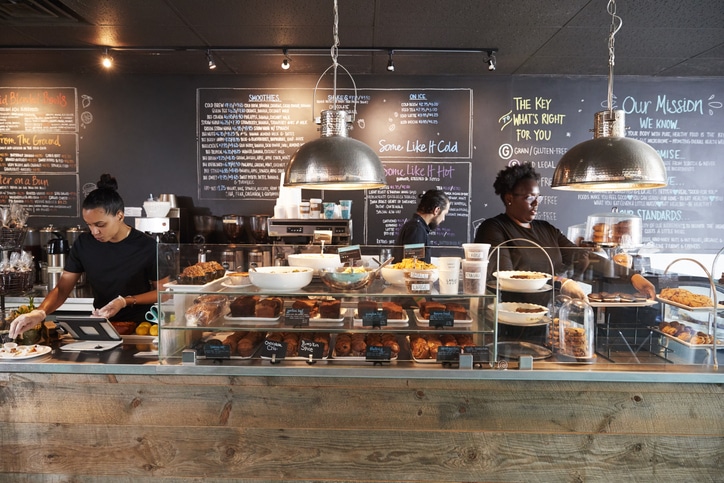The food industry in the GCC region faces uncertainties, mainly in the areas of price, supply and demand. And although new entrants and existing businesses alike will meet a complex market that is continually changing, opportunities for growth exist.
The retail sector, a vital driver of the GCC economy, is fragmented, with expectations of gradual consolidation. Domestic retailers need to adopt differentiated strategies, collaborations and adjustments to maintain competitiveness and market share.
This is more prevalent in recent years due to continued consolidation in the retail sector and the rapid entry of global hypermarkets and supermarkets, which is intensifying competition.
The report at a glance
GCC requires a robust logistics and supply chain management network to ensure quality and timely supply of both local and imported products.
We believe that the GCC food retail sector will witness a wave of consolidation.
The global food supply chain has evolved and become ever more efficient in developed markets such as North America, Europe, and the UK. Generally, the opposite is the case in GCC.
Leading companies are investing in their supply chain, with a reduction of cost and complexity to achieve efficiency remaining the critical focus area.
Rising concerns over food safety to drive increased usage of information technology and sophisticated supply chain solutions.
Family businesses need to restructure to grow and compete with international players.
Rising demand for food, the government’s focus on food security and consolidation in the food retail sector are expected to drive investments in the food industry in the form of M&As in the GCC.
There is significant potential for the use of private labels by GCC retailers.
The landscape today and adapting for the future
According to the Arab Agricultural Development Organisation (AADO) statistics for 2012, net imports account for 78% of food consumption in GCC. A lack of domestic agricultural output is mainly driven by limited arable land and the scarcity of water caused by the region’s extreme climatic conditions.
GCC’s reliance on imports
With demand levels on the rise thanks to and growing population and increasing incomes, food security is a priority in the region. Changing consumption patterns is also presenting challenges for local producers to find a differentiation to compete.
A robust supply chain network is needed
A robust logistics and supply chain management network are required to ensure quality and timely supply of both local and imported products.
Volatile food prices, supply shortages and the growth of hypermarkets and supermarkets contributing to an increase in the volume of sales unearths opportunities for a specialised and developed food supply chain system in GCC.
Food’s share of total retail sales in GCC is likely to increase from an estimated 47% in 2011 to 50% by 2016. This will heighten focus on optimisation of the food supply chain.
The GCC food retail sector is fragmented
The GCC has a fragmented food retail sector which is dominated by many small, local players; but growth in food concepts—from hypermarkets to small convenience stores—presents opportunities.
The GCC food retail sector has witnessed phenomenal growth in the past few years, outpacing some of the more mature and developed markets such as the US and Europe. All retail food concepts, from hypermarkets to small convenience stores, have shown rapid growth.
Among public companies, Savola, Almarai, and Americana account for the majority of revenues generated by publicly listed food companies in the GCC.
The activities of these major food companies illustrate how the market is evolving. According to our research, further consolidation seems imminent with the larger players best positioned to capitalise on the trend.
UAE: A pioneer in organised retail with well-established supply chain network
The UAE is considered a pioneer in modern retail in GCC. Its retail landscape has been significantly influenced by the West. International hypermarket/ supermarket chains are continuously innovating and adjusting operational strategies to stay competitive.
Retailers such as Carrefour and Geant are also rolling out additional mini-stores in new community centres, which are often located in the outskirts of towns to cater to the residents of these areas.
With the changing strategy of retailers, we believe an efficient food supply chain has become an urgent necessity for the overall logistics and retail industry in the UAE.
Saudi Arabia: Largest retail market with fragmented supply chain network
Saudi Arabia’s grocery retail market, the largest in GCC, is fragmented with the top five firms controlling only 13% market share. The number of hypermarkets was projected to increase by nearly 70%, while supermarkets were estimated to grow in number by 54% from 2013 to 2018.
Along with their expected growth, hypermarkets and supermarkets are heavily dependent on merchandising services (stocking shelves and maintaining inventory) offered by importers/distributors.
Rest of GCC: Relatively underdeveloped and fragmented modern retail sector, but gradually gaining importance
Although the industry is more fragment and less developed in the rest of the GCC, modern concepts are progressively gaining popularity. In Qatar, increasing demand from Western expatriates who prefer organised retail form is driving the trend. With rising demand and changing preferences, large regional players such as LuLu and global players such as
Carrefour have started to increase their presence in the country.
The hypermarket/ supermarket segment is yet to gain the same foothold in Kuwait as it has in other GCC markets although it has significantly strengthened in recent times. Moreover, Kuwait has the lowest modern grocery retail penetration in the GCC region.
While in Bahrain, they are gradually gaining traction. We are seeing a shift from grocery retailing towards more Westernised, modern retail outlets.
Independent grocery stores continue to account for the majority of food sales in Oman, but changing lifestyles and increasing spending capacity have boosted the demand for organised food retailing.
The global food supply chain has evolved
The global food supply chain is transforming in complex ways, driven by economic prosperity, urbanisation, and social changes. However, with constantly changing dynamics, companies are continuously facing the challenges of reducing supply chain costs and adjusting strategy to cater to changing consumer preferences to maintain competitiveness.
In GCC, rapidly growing imports and food consumption are driving the demand for modern transportation and logistics systems. Increased focus on infrastructure and rising food demand provide a significant opportunity within the transport & logistics sector.
Over the years, developments in the supply chain in the mature markets indicate that even with a highly profitable and fast- growing logistics market, consolidation becomes imminent. With changing consumer preferences, service providers in the GCC will have to ensure that their service offerings and geographic footprints grow in line with customers’ demands.
The supply chain segment in GCC is fragmented and characterised by many global, regional and local players, providing a range of logistics services such as warehousing, trucking, and freight forwarding.
The cold chain segment has significant potential due to the growing market and low competition, but it requires substantial capital investment. Only a few players operate in the third-party food logistics segment.
Weak supply chain infrastructure is one of the key drivers of food inflation in GCC, resulting in wastage due to lack of storage facilities and transportation, which in turn adversely affects efficiency and leads to higher costs. The GCC requires a robust logistics and supply chain management network to ensure quality and timely supply of both local and imported products.
Leading companies are investing in supply chain
In developed markets, where the food supply chain is highly efficient, 56% of total food losses occur at the consumer end of the food value chain.
In contrast, for developing countries, approximately 60% of total food waste in these countries happens during production, handling or storage.
These high rates of food loss and waste indicate the need for centrally controlled, specialised and sophisticated distribution systems across the supply chain.
Leading companies around the world are investing in their supply chain and focusing on reducing cost and complexity to increase efficiency.
In our opinion, consolidation in the supply chain will lead to more timely delivery of food products, reduced wastage and higher economies of scale.
GCC players must partner with companies providing optimised supply chain solutions to stay ahead of the competition. This would enable knowledge and data sharing in terms of food storage best practices, consumer trends and inventory levels.
For family businesses, collaboration is required
Family businesses are prevalent in all GCC countries. On a sectoral basis, the retail & trading sector has the highest concentration of family businesses, followed by the food & beverage sector. Collaboration with global retailers will enable family businesses to gain knowledge, expertise, and best practices to reposition themselves for growth.
Our research tells us that family-owned businesses need to adjust their operational strategy to remain competitive in the dynamic and changing business environment by:
Reviewing existing businesses to create a sharper focus
Focusing on profitable companies rather than concentrating on traditional businesses
Establishing new guidelines to distinguish between family and business activities
Evaluation of new investments with a focus on return on capital
Investment scenario for food is promising
The food industry, especially processed food, offers substantial business opportunities. The demand for processed food has grown significantly and accounts for over 50% of GCC’s total food demand. Governments are assisting both domestic and global manufacturers in setting up additional manufacturing units.
Increased spending, a growing population and changing consumer preferences are attracting investment in the GCC food industry, largely in the form of M&A.
Strategic players see M&A as a way to expand their geographic footprint, while for sovereign wealth funds, it is about gaining food security at the primary production level. We see this trend continuing.
The use of private labels offers considerable potential
Over the last three years, private label products have increased their market share by more than threefold in GCC from 3% to 10%.
However, it remains well below the equivalent percentage in mature markets such as the US (22%) and Germany (32%), where private labels account for a sizeable portion of the retailer’s value proposition.
Retailers in the US and European market consider private labels to be a key differentiating factor. Regional retailers are recognising private label potential.
Outlook and opportunities
An understanding of how the food value chain needs to evolve and collaboration among various stakeholders in the food value chain is essential.
Ensuring food safety across an increasingly complex global supply chain while following regulatory compliance is a significant challenge faced by the food industry.
Food processors need to work with both upstream and downstream partners in the food value chain to ensure food security, reduce the risks associated with food safety, and improve communication among various stakeholders.
In our view, the food industry, especially dairy, red meat, and poultry segments, offer significant investment opportunities for both strategic and financial investors.
Family-owned business must adjust their strategy to remain competitive in the current dynamic and evolving business environment.
We believe food business strategies should include additional focus on developing private labels.
Food industry insights
As the GCC food industry contends with price uncertainties, supply challenges, and evolving markets, the strategic importance of supply chain optimisation and operational efficiency cannot be overstated. Farrelly Mitchell is uniquely placed to help businesses in the GCC region overcome these challenges and turn them into growth opportunities.
We provide holistic support to businesses across the GCC food supply chain, providing services in areas such as market entry & development, strategy & execution, and risk analysis & management. To achieve operational excellence, enhance competitive advantage, and contribute positively to food security and sustainability, contact our team today.
For a more in-depth look at the opportunities for supply chain consolidation in GCC food industry, and to read our first-hand research findings, download the full report below.













